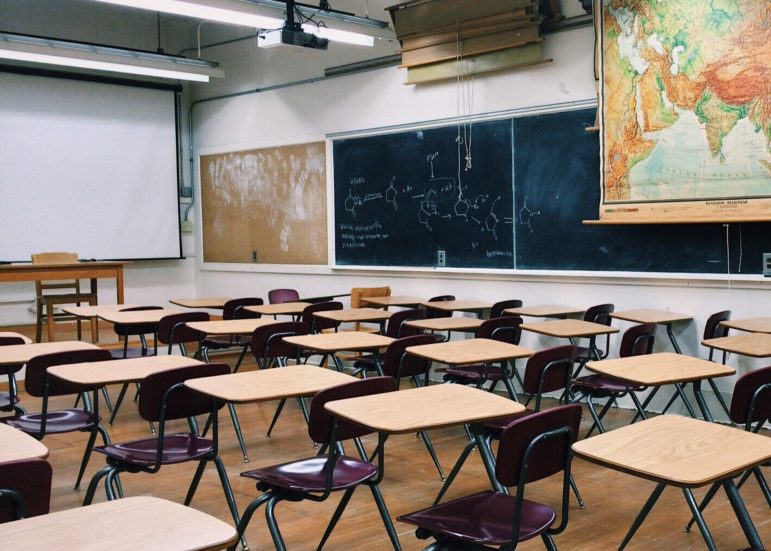Editorial note: The Alliance Defending Freedom uses the acronym ADF. It is not related to Ár nDraíocht Féin: A Druid Fellowship, a well-established group in the Pagan community that uses the letters ADF also. We have avoided using the acronym ADF in this story to prevent confusion.
TWH – The impacts of the growing political tensions on education has increased the pressure on educators and administrators when it comes to the content and how certain subjects are taught in the classroom.

Image credit: Steve Buissinne from Pixabay
According to a recent survey of 682 high school principals conducted by researchers at the University of California Los Angeles and the University of California Riverside, the “political conflicts impacting schools are pervasive and growing, with more than two-thirds of principals surveyed reporting substantial political conflict over hot-button issues. Almost half (45%) of principals said the amount of community-level conflict during the 2021-2022 school year was ‘more’ or ‘much more,’ than prior to the pandemic. Only 3 percent said it was less.”
Administrators and teachers have frequently come under fire from conservative political groups when it comes to the issues surrounding race, gender, and sexuality.
Recently during an Asheville City School Board meeting a local pastor, Ronald Gates, who identified himself as an “ambassador” for the Alliance Defending Freedom group repeatedly verbally attacked and misgendered the Board’s only transgender member, Peyton O’Conner, during the public comment segment of the meeting.
The Alliance Defending Freedom is designated as a hate group by the Southern Poverty Law Center (SPLC) and the Alliance Defending Freedom identifies itself as “an American conservative Christian legal advocacy group that works to curtail rights for LGBTQ people; expand Christian practices within public schools and in government; and prevent access to abortion.”
The Alliance Defending Freedom has brought a number of cases against schools across the country over policies designed to be inclusive and that emphasize anti-racism. Some of the lawsuits the Alliance Defending Freedom has filed ended up before the Supreme Court and resulted in rulings that have eroded or undermined LGBTQ+ rights.
O’Conner resigned three weeks later, citing Alliance Defending Freedom’s tactics when it comes to the lawsuits they file and stating it would “turn our district into the circus and s— show that he [Gates] and the [Alliance Defending Freedom] desire. This isn’t a guess, the [Alliance Defending Freedom] makes no attempt to hide its tactics. In light of that, I’ve decided to step down, so that that fight can hopefully be taken elsewhere. I didn’t come by that decision lightly,” O’Conner said in a Facebook post and in comments during the December 5 meeting.
In the classroom, educators can find themselves walking a fine line when it comes to how they present material and deciding how to respond to students when that material challenges a student’s worldview or belief system.

Image credit: Wokandapix from Pixabay
An educator who identifies as a Witch and teaches college-level history courses that often include high school students told TWH that, “younger [high school] students often do not yet possess the maturity or experience in managing curated materials that might be challenging topics and subjects—like James Baldwin.”
The requirements and evaluation process for high school students to take college-level courses are solely based on the grade point average. The college courses offered are free in the state of North Carolina through the Career and College Promise (CCP) program for eligible high school students.
The educator went on to say that, in particular, “literature that deals with racial and civil rights often leaves students mind-blown,” and that this is particularly true for students coming from families where they were sheltered from the news or certain viewpoints.
On culture class subjects they said, “Their first exposure in college courses that address subjects like British/American history can really disrupt or challenge their world view.” And this can generate questions from parents about how or why a particular book was chosen or being taught.
Students coming from families and communities more aligned with fundamentalist beliefs and values can find themselves particularly challenged when confronted with course material that is in opposition to deeply ingrained cultural and religious beliefs.
The educator said they believe that “It is these fundamentalist beliefs that are at the heart or core of what is driving a lot of the issues that school boards are being tasked with addressing, and that can place teachers in the cross hairs of division.”
They also pointed out, “Schools rely on funding from the county and state and administrators tend to focus on enrollment to maintain that funding, and are not often willing to address the harder issues.”
As a backdrop to the issues of philosophical challenges and how it can impact both content and the way courses are taught, students and faculty alike are under continual duress from the persistent and constant threat of physical violence from a potential school shooting that could occur at any moment.
Adding to all of that is also the ongoing concern over the spread of Covid-19 and the division created by attempting to implement mitigation measures. A number of school systems across the country, like the one in Philadelphia, have already notified parents and students that masks will be required for the first two weeks of January 2023.
Schools have seen a record number of teachers either leaving or planning to leave the profession of education, especially when it comes to public school systems. A survey conducted by the National Education Association (NEA) this year reflected alarming numbers, showing that 80% of educators cite burnout, and 55% indicated they are planning to leave earlier than they had planned.
Teacher shortages have been in the news this year just as students returned to classrooms this fall. The NEA was estimating a shortage of roughly 300,000 teachers with rural communities being the most impacted. Educators were either already leaving the field, while potential new educators were declining to sign up for teacher education courses. The pandemic also accelerated these issues.
Considering all the challenges and threats that educators must face each day, it should come as no surprise that many are retiring or leaving the profession and too few are lining up to take their places.
The educator quoted in this story requested to not be publicly identified by name due to concern over possible retaliation.
The Wild Hunt is not responsible for links to external content.
To join a conversation on this post:
Visit our The Wild Hunt subreddit! Point your favorite browser to https://www.reddit.com/r/The_Wild_Hunt_News/, then click “JOIN”. Make sure to click the bell, too, to be notified of new articles posted to our subreddit.